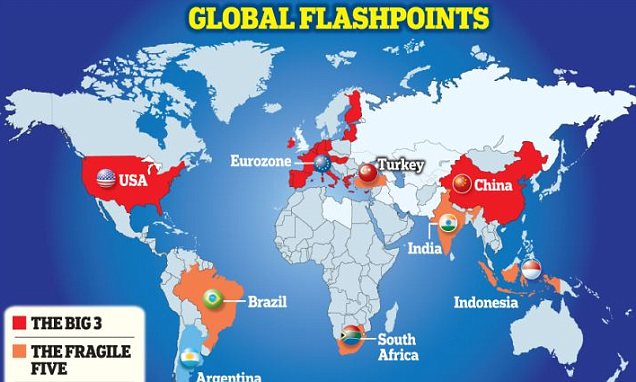The world is under pressure from critical issues: high-stakes diplomacy, global temperatures, etc. In 2025, economies, politics, and survival strategies are determined by trade agreements, crises of humanitarian nature, natural disasters, and global summits.
These five vital occurrences during the month will be broken down below.
U.S.–EU Trade Deal Averts Tariff Shock
The U.S. and European Union announced a significant trade deal, which will stop the possibility of serious and harmful increases in tariffs in automobiles, agricultural products, and green technology segments. The talks ended after several months of tensions where the two parties agreed to relax the current tariffs as well as invest on better frameworks in transatlantic opportunities.
The deal holds off any U.S. tariffs against European electric cars and steel and the EU will reduce taxes on U.S. agricultural products. Further, the two further resolved to share new commitments on supply chain resilience and carbon alignment mechanisms.
Table 1: Trade Deal Snapshot
| Element | Details |
| Tariff Levels | U.S. EV & steel tariffs suspended; EU cuts agri duties |
| EU Investment | €25B pledged in U.S. clean energy projects |
| Market Reaction | Dow Jones +1.8%, EuroStoxx 50 +2.3% |
| Potential Extensions | Digital trade & AI regulation talks planned |
This deal not only restores economic confidence but also sets a precedent for modernized global trade based on environmental and technological collaboration.
Gaza Aid Crisis and Middle East Conflict
Humanitarian disasters in Gaza have worsened with blockade to borders and access to relief materials. More than 70% of the population cannot get access to clean water, air, electricity, and other basic health materials regularly. UN relief convoys are not reaching the region or being held back because military action persists in the region.
The fighting between the government forces and the rebel armies has also led to an increase in the number of civilian casualties in the Southern part of Syria. Meanwhile, Israeli airstrikes in the suburbs of Damascus to stop the alleged transfer of weapons have accelerated the states of instability in the region.
Table 2: Middle East Conflict & Humanitarian Snapshot
| Region | Key Issue | Impact / Stats |
| Gaza | Aid blockage & internal conflict | 2.2M people affected; 78% food insecure |
| Southern Syria | Rebel-government clashes | Over 14,000 displaced in July alone |
| Damascus | Israeli airstrikes | 12 targets hit; infrastructure damage reported |
The situation is drawing urgent international calls for ceasefires, aid corridors, and conflict mediation, especially as civilian tolls mount by the hour.

European Heatwaves and Mediterranean Wildfires
One of the strongest heatwaves in the history of Europe is being experienced. The temperatures in Spain, France, Italy have exceeded 44 with health warnings and blackouts being declared all over. Heatstroke victims flood emergency rooms mostly among the aged and children. At the same time, Mediterranean coasts are burning with wildfires.
In southern Greece and Sardinia whole villages have been evacuated. Nevertheless, thousands of hectares of arable land and safe forest have already been burned, and even smoke columns stretched in Eastern Europe. Meteorologists attribute this to El Nino and fast-moving climatic change. This year has registered a 36 percent rise in wildfire outbreaks than 2024. Governments are putting into action the drones and the AI-based models to foresee fire routes and coordinate evacuations.
Devastating Flash Floods in Central Texas
Unusual weather made flash floods severe in the middle of Texas, with cities such as Austin, Waco, and San Antonio being hit. Massive floods reaching up to 15 inches in less than 48hrs led to spill overs in rivers and total occupation of entire neighborhoods. The utility companies have power outages on more than 60,000 people and over 900 high water evacuations were carried out by emergency responders. There are collapsed bridges, damaged highways and flooded hospitals which involve the destruction of infrastructure.
Governor Reynolds declared an emergency on a statewide basis and sought federal help. Environmentalists caution that the clogged drainage system and sprawling development are worsening and increasing flash flooding in the southern part of the country. The Biden administration in turn has committed to provide $2 billion in funds to preemptive flood resistant measures in a state-wide package, such as improved levees, stormwater control and early flood warning.
BRICS Summit and Global Governance Push
The BRICS Summit of 2025 in Rio de Janeiro entailed a significant change of the discourse in global governance. Brazil, Russia, India, China, South Africa (BRICS) and newly adopted leaders (Egypt, Saudi Arabia and Indonesia) met to deliberate on a new economic order that would minimize the dependency on the western financial system. Among the main conclusions, it was introduced to launch the digital transaction system the so-called BRICS Pay, a joint development fund offered, and coordinated action on climate resiliency in the Global South.
Russia and China came together to demand a United Nations Security Council reform that will incorporate BRICS into it. India laid stress on digital cross-border infrastructure in developing countries. This international emphasis on multipolarity by the summit may remake the global alliances. Some western analysts consider this as a threat to the current framework but some people claim that it is the need to evolve to allow all global development to be inclusive.
Graph: Environmental & Health Trends (2023–2025)
Graph Description:
A line chart showing three steeply rising trends from 2023 to 2025:
- Heat-Related Deaths:
Up 80% in Europe and Southeast Asia due to record-breaking temperatures. - Coral Bleaching Events (% of reefs affected):
Climbed from 39% in 2023 to over 68% in 2025 across the Pacific and Indian Oceans. - Vector-Borne Disease Cases (e.g., Chikungunya, Dengue):
Up 140%, particularly in tropical Asia and Latin America.
This highlights the overlapping crises of climate, biodiversity, and public health.
Final Words
The global problems that have been witnessed today, including environmental catastrophes to economic and diplomatic relations and military conflict are becoming interrelated. The future of humanity depends on the world reaction to these challenges whether this decade or the next. Our only hope is timely partnership and responsibility.
Frequently Asked Questions (FAQs)
Q1. Which industries does the U.S. U.E trade deal impact?
The automobile, agriculture, green energy and digital services industries are affected by the trade deal. Some of the main beneficiaries include U.S farmers and EV manufacturers based in the EU.
Q2. What makes European heatwaves even worse in 2025?
The effects of chronic climate change make this year’s heatwaves more intense. The endangerment of the temperatures by Urban heat island phenomena and long-lasting droughts also occurred.
Q3. What was the central focus of the BRICS Rio Summit?
The summit had an emphasis on creating an alternative financial system, encouraging digital collaboration between developed economies, and supporting climate adaptation financing on the behalf of the Global South.


